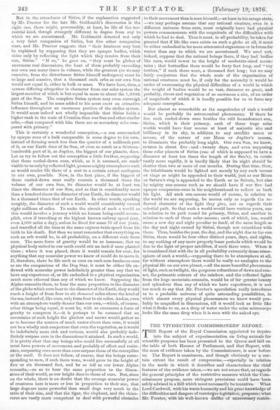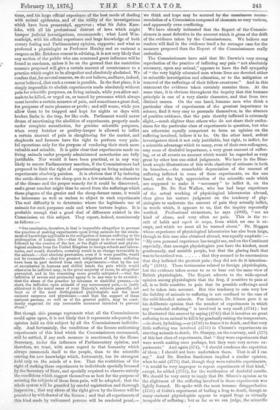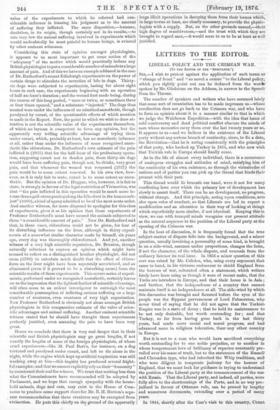THE VIVISECTION COMMISSIONERS' REPORT.
THE Report of the Royal Commission appointed to inquire into the subject of experimentation on living animals for scientific purposes has been presented to the Queen and laid on the table of both Houses of Parliament, and that Report, with the mass of evidence taken by the Commissioners, is now before us. The Report is unanimous, and though obviously to a cer- tain extent the result of compromise,--especially in relation to the mode in which it describes and characterises the chief features of the evidence taken,—we are not aware that, as regards the general principles of the restrictive measure which the Com- missioners propose, more stringent provisions could have been safely advised in a Bill which must necessarily be tentative. What Lord Cardwell, with his warm humanity and his great knowledge of the difficulties and dangers of restrictive legislation, proposes ; what Mr. Forster, with his well-known dislike of unnecessary restric-
Eons, and hi a large official experience of the beat mode of dealing with animal epidemics, and of the utility of the investigations which have been prosecuted, approves ; what Sir John Kars- lake, with all his professional distrust of laws which might hamper judicial investigations, recommends ; what Lord Win- marleigh, with his official experience and large knowledge of both county feeling and Parliamentary opinion, supports; and what so profound a physiologist as Professor Huxley and so eminent a surgeon as Mr. Faichsen concur in advising, it is not very likely that any section of the public who can command great influence will be
found to condemn, unless it be on the ground that the restrictive
measure proposed will give a certain amount of countenance to a practice which ought to be altogether and absolutely abolished. We confess that, for several reasons, we do not believe, andhave, indeed, never believed, that such a course is possible. In the first place, it is simply impossible to abolish experiments made absolutely without pain for scientific purposes, on living animals, while youallow ani- mals to be killed, or urged on, or tamed by processes which always must involve a certain measure of pain, and sometimes a great deal, for purposes of mere pleasure or profit ; and still worse, while you allow them to be trapped and kept for nights or days with broken limhs in the trap, for like ends. Parliament would never dream of sanctioning the abolition of experiments, properly made under complete anaesthetics, for genuine scientific purposes, when every butcher or poultry-keeper is allowed to inflict a certain amount of pain in slaughtering for the market, and shepherds and farmers have the right to perform very pain- ful operations only for the purpose of rendering their stock more valuable and saleable. It is quite clear that experiments made on
living animals. under properly administered anwithetics are fully justifiable. Nor would it have been practical, or in any way
likely to secure Parliamentary sanction, if the Commissioners had proposed to limit the right of experimenting on living animals to experiments absolutely painless. It is obvious that if by inducing the cattle-disease or the sheep-pox in a few animals, the character of the disease and the proper remedy for it could be discovered, and a great number might thus be saved from the sufferings which these plagues of the grazier and the sheep-farmer cause, it would be inhumane as well as useless to object to such experiments The real difficulty is to determine where the legitimate use of animals for such purposes ends and where torture begins. It is probable enough that a good deal of difference existed in the Commission on this subject. They report, indeed, unanimously as follows :—
"Our conclusion, therefore, is that is impossible altogether to prevent the practice of making experiments upon living animals for the attain- ment of knowledge applicable to the mitigation of human suffering or the prolongation of human life :—that the attempt to do so could only be followed by the evasion of the law, or the flight of medical and physio- logical students from the United Kingdom to foreign schools and labora- tories, and would, therefore, certainly result in no change favourable to the animals :—that absolute prevention, even if it were possible, would not be reasonable :—that the greatest mitigations of human suffering have been in part derived from such experiments :—that by the use of anantheties in humane and skilful hands the pain which would otherwise be inflicted may, in the great majority of cases, be altogether prevented, and in the remaining cases greatly mitigated :—that the infliction of severe and protracted agony is in any tase to be avoided : that the abuse of the practice by inhuman or unskilful persons,—in short, the infliction upon animals of any unnecessary pain,—is justly abhorrent to the moral sense of your Majesty's subjects generally, not least so of' the most distinguished physiologists and the most eminent surgeons and physicians :—and that the support of these eminent persons, as well as of the general public, may be confi- dently expected for any reasonable measures intended to prevent abuse."
But though this passage represents what all the Commissioners could agree upon, it is not likely that it represents adequately the opinion held on this subject by all the Commissioners individu- ally. And fortunately, the conditions of the license authorising experiments of this kind which the Commissioners recommend, will be settled, if any such measure is sanctioned, by the Home Secretary, under the influence of Parliamentary opinion, and therefore, we trust, with more regard to that humanity which always commends itself to the people, than to the scientific craving for new knowledge which, fortunately, has its strongest hold only on the minds of a few. That the restriction of the right of making these experiments to individuals specially licensed by the Secretary of State, and specially required to observe strictly the conditions which suggest themselves as best for the purpose of _seeming the subjects of them from pain, will be adopted; that the whole system will be guarded by careful registration and thorough inspection ; that any abuse of the right given by the licence will be
punished by withdrawal of the licence ; and that all experiments of tbis kind made by unlicensed persons will be rendered penal,— we think and hope may be secured by the unanimous recom- mendation of a Commission composed of elements so very various, and apparently even conflicting.
We have already intimated that the Report of the Commis- sioners is most defective in the account which it gives of the drift of the evidence taken by the Commissioners. We believe our readers will find in the evidence itself a far stronger case for the measure proposed than the Report of the Commissioners really embodies.
The Commissioners have said that Mr. Darwin's very strong reprobation of the practice of inflicting any pain "not absolutely necessary, upon any animal," appears to have the full sympathy of "the very highly educated men whose lives are devoted either to scientific investigation and education, or to the mitigation or removal of the sufferings of their fellow-creatures." And in this statement the evidence taken certainly sustains them. At the same time, it is obvious throughout the inquiry that this humane principle is one of a very elastic character, and that from two distinct causes. On the one hand, humane men who think a particular class of experiments of the greatest importance to science, find it very easy to persuade themselves, in the absence of positive evidence, that the pain thereby inflicted is extremely slight,—much slighter than others who do not share their enthu- siasm for the particular class of experiments in question, but who are otherwise equally competent to form an opinion on the suffering involved, believe it to be. On the other hand, ardent investigators think it not only justifiable, but right, to inflict, for a scientific advantage which to many, even of their own colleagues, may seem of doubtful importance, a very great amount of suffer- ing, or at all events an amount which would be regarded as very great by other less one-sided judgments. We have in the Blue- book ample illustrations of this wide elasticity of estimate in both its branches,—the remarkable depreciation of the amount of suffering inflicted in some of these experiments, on the one hand, and the high appreciation of the scientific ends which are supposed to make it " necessary " to inflict it, on the other. Dr. De Nod Walker, who has had large experience of the actual working of physiological laboratories abroad, thus gives his mature judgment on the tendency of phy- siologists to underrate the amount of pain they actually inflict, in words which, it appears to us, that the inquiry repeatedly verified. Professional vivisectors, he says (4909), "see no kind of abuse, and very often no pain. This is the re- sult of habit and esprit de corps, from which no one is ex- empt, and which we must all be warned about." Dr. Hoggan whose experience of physiological laboratories has also been large, though in this case also obtained abroad, was equally emphatic :— " My own personal experience has taught me, and on the Continent especially, that amongst physiologists you have the kindest, most gentlemanly, and amiable people, but that the glaring fault that was to be noticed was that they seemed to be unconscious that they inflicted the greatest pain ; they did not do it intention- ally" (4244). These testimonies related to foreign physiologists, but the evidence taken seems to us to bear out the same view of British physiologists. The Report adverts to the wide-spread opinion among physiologists that the frog, if sensitive to pain at all, is so little sensitive to pain that its possible sufferings need not be taken into account. But this tendency to rate very low the liability of animals to suffering is not confined to the case of the cold-blooded animals. For instance, Dr. Sibson gave it as his deliberate opinion that the number of experiments in which any "material suffering" is involved is very small (4744) ; but he illustrated this answer by saying (4745) that it involves no great suffering to an animal to kill it by gradually raising the temperature, —in short, bybaking,—or (4749) to freeze it to death, and that very little suffering was involved (4751) in Chossat's experiments on starving animals to death. Dr. Sharpey, on the contrary, said (573) of this last class of experiments, that " they were experiments that were worth making once perhaps, but they were very severe ex- periments." And again (574), "1 should condemn the repetition of them ; I should not have undertaken them. That is all I can say." And Dr. Burdon Sanderson implied a similar opinion, when be said (2774) that, though they were valuable experiments, "it would be very improper to repeat experiments of that kind," except, he added (2775), for the verification of doubtful results. We should be very sorry to imply that Dr. Sibson's opinion as to the slightness of the suffering involved in these experiments was lightly formed. He spoke with the most humane disapprobation (4750) of Goltz's experiment of boiling a frog to death, though so many eminent physiologists appear to regard frogs as virtually incapable of suffering ; but as far as we can judge, the scientific
value of the experiments to which he referred had con- siderable influence in biassing his judgment as to the amount of suffering they inflicted. The same disposition,—humane, doubtless, in its origin, though certainly not in its results,—to rate very low the animal suffering involved in experiments which would undoubtedly be most painful to human beings, is evinced by other eminent witnesses.
Considering this state of opinion amongst physiologists, it appears to us most important to get some notion of the " adequacy " of the motive which would practically induce any British physiologist to put a considerable number of animals to a large amount of pain. And of this we have an example adduced in the ease of Dr. Rutherford's recent Edinburgh experiments on the power of certain drugs to stimulate the secretion of bile in dogs. Thirty- six dogs were subjected to experiments, lasting for about eight hours in each case, the experiments beginning with an operation of half -an-hour's duration ; and the wound first made being, during the course of this long period, "once or twice, or sometimes three or four times opened," and a substance "injected." The dogs thus treated were under the influence of no admitted anmsthetic, though paralysed by curari, of the questionable effects of which mention is made in the Report. Now, the point to which we wish to draw at- tention is not the scientific value of the experiments themselves, of which no layman is competent to form any opinion, but the Apparently very trifling scientific advantage of trying them under curari, which, probably at least, has no anmsthetic influence at all, rather than under the influence of some recognised anms- thetic like chloroform. Dr. Rutherford's own estimate of the pain inflicted is (2931) that for the half-hour of the preliminary opera- tion, supposing curari not to deaden pain, these thirty-six dogs would have been suffering pain, though not, he thinks, very great pain, and that whenever the wound was reopened (2927) the pain would be to some extent renewed. In his own view, how- ever, as it is only fair to state, curari is to some extent an aims- thetic. But the opinion of Dr. Hoggan, who, however, it is fair to state, is strongly in favour of the legal restriction of Vivisection, was that "the pain inflicted in this operation would be much more in- tense than a gall-stone passing along the bile-duct in the humansub- ject" (4060), a kind of agony admitted to be of the most acute order. And another witness, far more disposed to apologise for this class of experiments, gives it as his opinion that these experiments of Professor Rutherford's must have caused the animals subjected to them "a considerable amount of pain." Now Dr. Rutherford said that, in these cases, chloroform could not be given, for fear of its disturbing influence on the liver, although in thirty experi- ments of a somewhat similar character made by himself, six years ago, every dog was thoroughly chloroformed. And yet, another witness of a very high scientific reputation, Dr. Brunton, though naturally reluctant to express an opinion which might have seemed to reflect on a distinguished brother physiologist, did not seem (5760) to entertain much doubt that the effect of chloro- form on the liver might have been separately ascertained, and so eliminated (even if it proved to be a disturbing cause) from the scientific results of these experiments. This severe series of experi- ments, performed under no recognised anwithetic, certainly leaves on us the impression that the lightest feather of scientific advantage, will often seem to an ardent investigator to outweigh the most 'considerable presumption of inflicting serious suffering on a large number of creatures, even creatures of very high organisation. Now Professor Rutherford is obviously not alone amongst British physiologists in this comparative estimate of the value of scien- tific advantages and animal suffering. Another eminent scientific witness stated that he should have thought these experiments perfectly justified, even assuming the pain to have been very great.
Hence we conclude that there is very real danger that in their scientific zeal British physiologists may go great lengths, if not exactly the lengths of some of the foreign physiologists, of whose cruel experiments—like M. Paul Bert's, for instance, on a dog tortured and paralysed under curari, and left to die alone in the night, while the engine which kept up artificial respiration was still working away at him—this inquiry has produced several fright- ful examples; and that we cannot explicitly rely on their " humanity " to counteract their zeal for science. We trust that nothing less than what the Commissioners have recommended will be adopted by Parliament, and we hope that enough sympathy with the house- hold animals, dogs and cats, may exist in the House of Com- mons to produce some support there for Mr. IL H. Hutton's sepa- rate recommendation that these creatures may be exempted from vivisection. He puts this chiefly on the ground of the apparently large illicit operations in decoying them from their homes which, in large towns at least, are clearly necessary, to provide the physio- logists with a supply. But, on the other grounds named,—their high degree of sensitiveness,—and the trust with which they are brought to regard man,—it would seem to us to be at least as well justified.




































 Previous page
Previous page